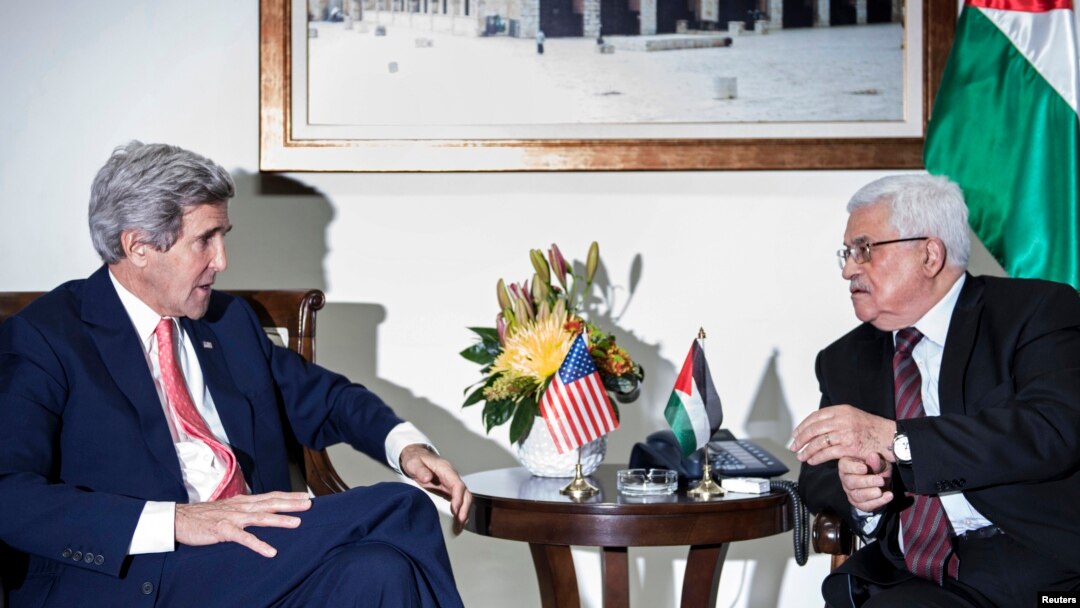JERUSALEM —
U.S. Secretary of State John Kerry is continuing talks with Israeli and Palestinian Authority leaders in hopes they can soon agree on a framework peace deal.
Kerry met Friday with Palestinian President Mahmoud Abbas in the West Bank city of Ramallah. Several hundred protesters marched through the streets there ahead of the U.S. diplomat's visit to denounce the peace talks as a delay tactic.
He first held talks with Israeli Foreign Minister Avigdor Lieberman seeking to broaden support for the peace talks among right-wing members of the Israeli government.
Lieberman said in a statement that any agreement between Israel and the Palestinians must be based on the strong foundations of security for Israel and a stable economy for the Palestinians. He stressed the importance of continued dialogue between the two parties.
Lieberman previously has been critical of the U.S. diplomatic efforts but recently has moderated his comments.
Kerry began his trip on Thursday by saying he hoped to narrow differences over a framework to provide guidelines for permanent status negotiations.
"It would address all of the core issues. It would create the fixed defined parameters by which the parties would then know where they are going and what the end result can be," he said.
"It would address all of the core issues that we have been addressing since day one, including borders, security, refugees, Jerusalem, mutual recognition and the end of conflict and of all claims," Kerry added.
Israeli doubts
Israeli Prime Minister Benjamin Netanyahu responded on Thursday by saying there are growing doubts that the Palestinian leadership sincerely wants peace. He accused it of inciting violence among its people.
Palestinian leaders have accused the Israeli government of sabotaging the peace talks by continuing to expand Jewish settlements in the West Bank and East Jerusalem. They criticize the Israeli government for failing to thwart attacks by Jewish settlers against Palestinians.
Some Palestinians have protested Kerry's visit saying the U.S. government favors Israel in the peace talks.
An analyst with Tel Aviv's Institute for National Security Studies, Ephraim Kan, said there is a lack of trust on both sides.
"I'm not very optimistic about making any real progress in the negotiations with the Palestinians because both parties are not enthusiastic about it," he said. "Both parties are pessimistic about these negotiations. The Americans are putting pressure on both parties but it's not enough."
More meetings are scheduled for Saturday and Sunday. And Kerry's office has announced that he plans to return in a few weeks to continue the discussions.
Kerry met Friday with Palestinian President Mahmoud Abbas in the West Bank city of Ramallah. Several hundred protesters marched through the streets there ahead of the U.S. diplomat's visit to denounce the peace talks as a delay tactic.
He first held talks with Israeli Foreign Minister Avigdor Lieberman seeking to broaden support for the peace talks among right-wing members of the Israeli government.
Lieberman said in a statement that any agreement between Israel and the Palestinians must be based on the strong foundations of security for Israel and a stable economy for the Palestinians. He stressed the importance of continued dialogue between the two parties.
Lieberman previously has been critical of the U.S. diplomatic efforts but recently has moderated his comments.
Kerry began his trip on Thursday by saying he hoped to narrow differences over a framework to provide guidelines for permanent status negotiations.
"It would address all of the core issues. It would create the fixed defined parameters by which the parties would then know where they are going and what the end result can be," he said.
"It would address all of the core issues that we have been addressing since day one, including borders, security, refugees, Jerusalem, mutual recognition and the end of conflict and of all claims," Kerry added.
Israeli doubts
Israeli Prime Minister Benjamin Netanyahu responded on Thursday by saying there are growing doubts that the Palestinian leadership sincerely wants peace. He accused it of inciting violence among its people.
Palestinian leaders have accused the Israeli government of sabotaging the peace talks by continuing to expand Jewish settlements in the West Bank and East Jerusalem. They criticize the Israeli government for failing to thwart attacks by Jewish settlers against Palestinians.
Some Palestinians have protested Kerry's visit saying the U.S. government favors Israel in the peace talks.
An analyst with Tel Aviv's Institute for National Security Studies, Ephraim Kan, said there is a lack of trust on both sides.
"I'm not very optimistic about making any real progress in the negotiations with the Palestinians because both parties are not enthusiastic about it," he said. "Both parties are pessimistic about these negotiations. The Americans are putting pressure on both parties but it's not enough."
More meetings are scheduled for Saturday and Sunday. And Kerry's office has announced that he plans to return in a few weeks to continue the discussions.


